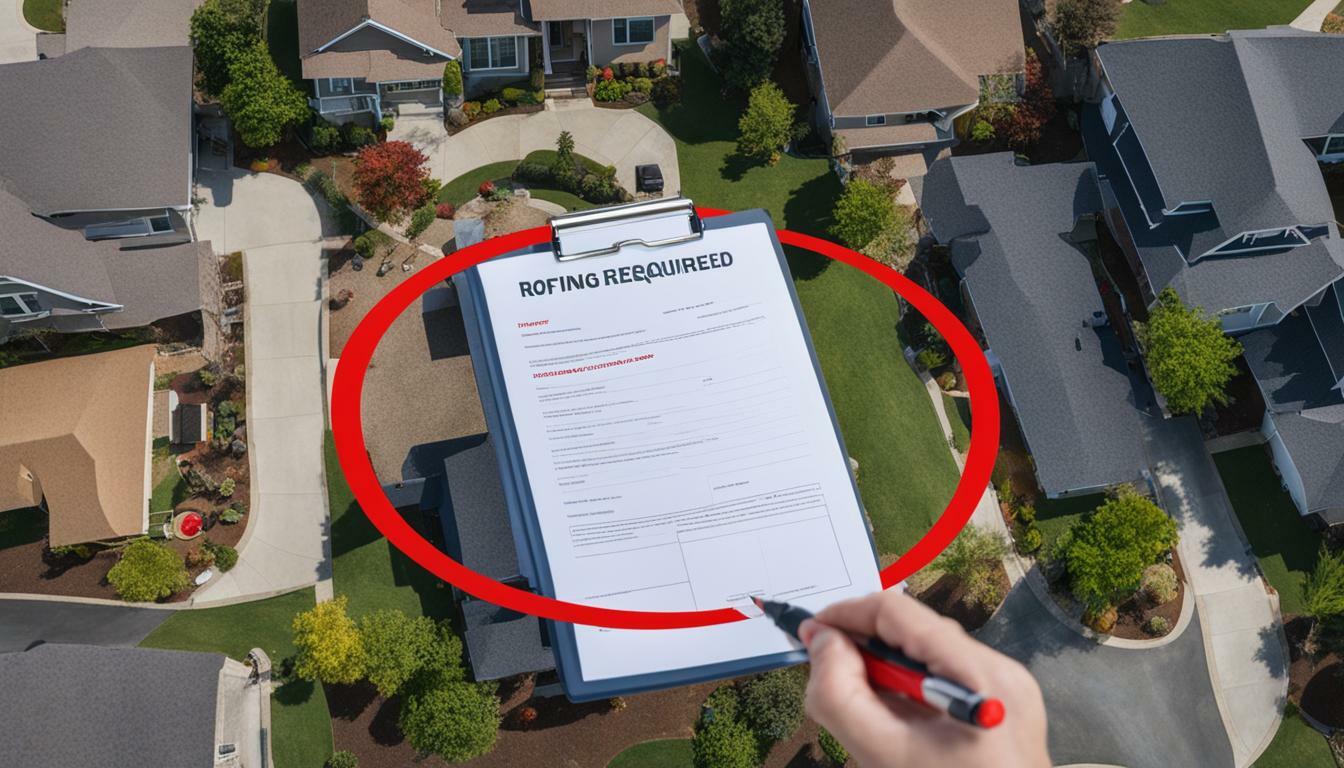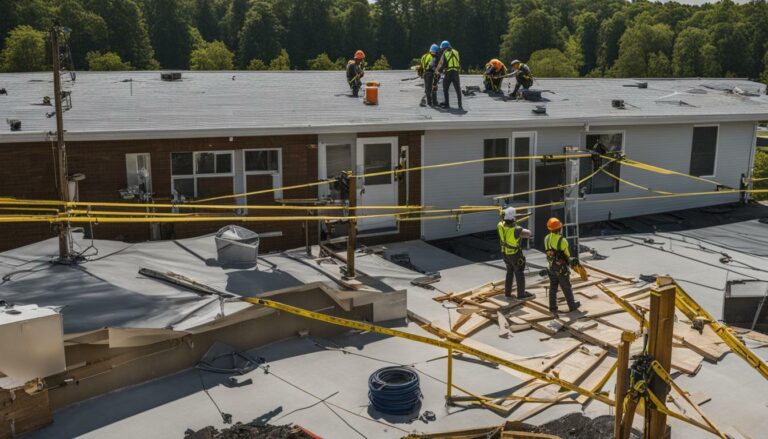Understanding Roofing Permits and Regulations: A Guide for You
Roofing permits and regulations play a crucial role in ensuring safety and compliance with local building codes for any roofing project. Whether you are roofing a new home, replacing an old roof, or making alterations to your roofline, obtaining the necessary permits is vital. These permits are required to maintain safety standards and ensure that the project meets all regulatory requirements.
- Roofing permits are necessary for projects that involve altering a building’s structure or creating hazardous conditions.
- Failure to obtain a permit can lead to penalties, fines, and complications when selling a home.
- The permitting process includes submitting detailed project information, seeking approval from the local building department, and scheduling inspections.
- Each state has its own specific regulations regarding roofing permits, so it is important to check the requirements in your area.
- Homeowners are responsible for obtaining permits, and working with licensed contractors familiar with local regulations is advisable.
Why Roofing Permits are Necessary
Roofing permits are necessary to ensure that roofing projects meet regulatory requirements and maintain safety standards. These permits are especially important for projects that involve altering a building’s structure or creating hazardous working conditions. Whether you’re roofing a new home, replacing an old roof, altering a roofline, or changing the roofing material, obtaining the proper permits is essential.
Failure to obtain a roofing permit can have serious consequences. Not only can it result in penalties and fines, but it can also create complications when selling a home. Building codes and regulations are in place for a reason – they ensure that roofing projects are done correctly and safely. By obtaining a permit, you are adhering to these standards and protecting both yourself and your property.
The process of obtaining a roofing permit typically involves submitting detailed information about your project to the local building department. This information helps officials assess the scope of the project and determine if it meets all necessary requirements. Once your project is approved, inspections are scheduled to ensure that the work is being done in compliance with the permit. These inspections play a crucial role in maintaining safety and quality in roofing projects.
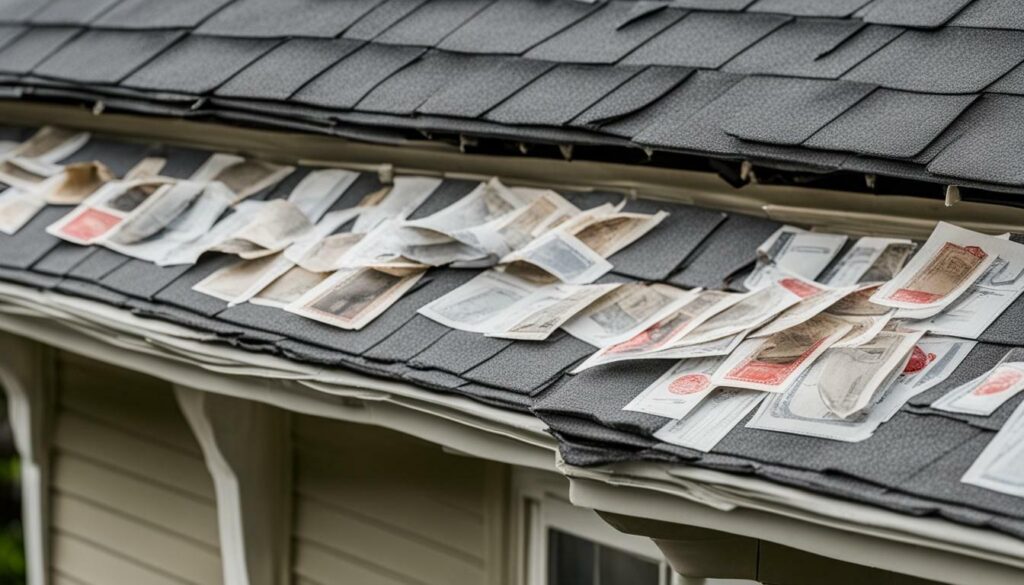
It’s worth noting that permit regulations can vary from state to state. In Florida, for example, roofing permits are required for major repairs and replacements. The specific requirements can vary depending on the size and scope of the project. It’s important to familiarize yourself with your state’s regulations and ensure that you are meeting all necessary requirements.
As a homeowner, it is your responsibility to obtain the necessary roofing permits. Failing to do so can lead to fines and the need to redo the work. To ensure a smooth and compliant roofing project, it is advisable to work with licensed contractors who are familiar with the local regulations and requirements. They have experience navigating the permitting process and can help you avoid potential pitfalls.
Key Takeaways:
- Roofing permits are essential for projects that involve altering a building’s structure or creating hazardous working conditions.
- Obtaining roofing permits ensures compliance with building codes and regulations and protects against fines and penalties.
- The permitting process involves submitting project details, obtaining approval, and scheduling inspections.
- Permit regulations vary from state to state, so it’s important to check the specific requirements in your area.
- Homeowners are responsible for obtaining roofing permits and working with licensed contractors can help navigate the process successfully.
Reference
Roofing permits are an essential part of any roofing project, ensuring compliance with regulations and maintaining safety standards. Failure to obtain a permit can have severe consequences, including penalties, fines, and complications when selling a home. By following the proper permitting process, homeowners can ensure that their roofing projects meet the necessary requirements and protect both themselves and their property.
Understanding Roofing Permits and Regulations: A Guide for You
Types of Roofing Projects Requiring Permits
Various types of roofing projects, including roof replacements, new construction, and alterations, typically require permits to ensure compliance with building codes. These permits are necessary to maintain safety standards and ensure that the roofing project meets the local regulations.
When it comes to roof replacements, obtaining a permit is essential. Replacing a roof involves significant changes to a building’s structure, and permits help ensure that the new roof meets the required standards. Similarly, for new construction projects, roof permits are necessary to ensure that the roof is built according to the specified plans and meets safety requirements.
In addition to roof replacements and new construction, alterations to the roofline or changes in the roofing material also require permits. Altering the roofline, such as adding dormers or skylights, can affect the integrity of the roof structure, and permits are needed to ensure that these alterations are safe and in compliance with building codes. Changing the roofing material, such as from asphalt shingles to metal, may also require permits to ensure that the new material complies with fire safety regulations and other relevant standards.
Table 1: Roofing Projects Requiring Permits
| Roofing Project | Permit Requirement |
|---|---|
| Roof Replacement | Required |
| New Construction | Required |
| Alterations to Roofline | Required |
| Changes in Roofing Material | Required |
It is important to note that the specific permit requirements may vary depending on the local building codes and regulations. Therefore, it is crucial to check with the relevant authorities to ensure compliance with the specific requirements in your area. Failure to obtain the necessary permits for roofing projects can result in fines, penalties, and complications when selling a home.

Working with licensed contractors who are familiar with the local regulations and requirements can help navigate the permitting process smoothly. Experienced contractors are knowledgeable about the necessary permits and can ensure that the roofing project meets all the required standards. They can also assist in obtaining the permits and scheduling the necessary inspections to ensure compliance throughout the project.
By understanding the types of roofing projects that require permits and working with licensed contractors, you can ensure a successful roofing project that meets all safety and compliance requirements.
The Permitting Process
The roofing permit process involves submitting detailed project information, obtaining approval from the local building department, and scheduling inspections to ensure compliance with regulations. When starting a roofing project that requires a permit, it is essential to understand the steps involved in the permitting process to avoid unnecessary delays and complications.
Firstly, you will need to gather all the necessary documentation and complete the permit application. This typically includes providing information such as the scope of work, roofing materials to be used, and any structural changes that will be made. It is important to be thorough and accurate in your application, as incomplete or inaccurate information can result in delays in obtaining the permit.
Once you have submitted your permit application, it will be reviewed by the local building department. The review process ensures that your project meets all the local roofing regulations and building codes. The timeframe for the review process can vary depending on the complexity of the project and the workload of the building department.
After your permit application is approved, you will be issued a roofing permit. This permit allows you to proceed with your roofing project and indicates that your plans comply with the necessary regulations. However, it is important to note that obtaining a permit is not the end of the process. You will also need to schedule inspections at various stages of the project to ensure that the work is being done according to the approved plans and in compliance with the regulations.
| Inspection Stage | Purpose |
|---|---|
| Pre-roofing inspection | To ensure proper installation of underlayment and flashing before shingles or other roofing materials are applied. |
| Roofing inspection | To check the installation of roofing materials, including proper fastening, alignment, and ventilation. |
| Final inspection | To verify that the completed roofing project meets all the necessary requirements and regulations. |
It is essential to schedule these inspections in a timely manner and ensure that you are present during the inspections. Failure to comply with the inspection requirements can result in penalties and the need to redo the work. Once all the inspections have been successfully completed and the roofing project is deemed compliant, you can close out the permit.
By understanding and following the permitting process, you can ensure that your roofing project meets all the necessary regulations and is completed safely and successfully. Remember to always check with your local building department for specific requirements and guidelines related to roofing permits in your area.

Roofing permit regulations can vary from state to state, and it’s crucial to understand the specific requirements in your area for both residential and commercial roofing projects. These regulations are put in place to ensure that roofing projects meet the necessary safety standards and adhere to local building codes. Failure to comply with these regulations can result in penalties, fines, and complications when selling a home or commercial property.
In states like Florida, roofing permits are required for major repairs and replacements, as well as for new construction projects. The specific requirements may vary depending on the size, scope, and type of roofing project. It is important to check with your local building department or code enforcement office to determine the specific permits needed for your project. By understanding the state-specific permit regulations, you can avoid unnecessary delays and ensure a smooth roofing process.
Working with a licensed roofing contractor who is familiar with local regulations and requirements is highly recommended. They will have the expertise and knowledge to navigate the permitting process effectively and ensure compliance with all necessary regulations. Additionally, they can provide guidance on the required documentation, inspections, and any other steps involved in obtaining the permits for your roofing project.
Residential Roofing Permits
For residential roofing projects, permits are typically required for various types of work, including roof replacements, alterations, and repairs. These permits are necessary to ensure that the work is done correctly and safely, protecting the homeowner and their property. It’s important to note that the specific permit requirements may vary depending on the location and the size of the project.
Commercial Roofing Regulations
Commercial roofing projects often have additional regulations and requirements compared to residential projects. These regulations may include specific fire safety measures, accessibility compliance, and adherence to zoning laws. It is essential for commercial property owners to be aware of these regulations and secure the necessary permits before starting any roofing work.

| State | Residential Roofing Permits | Commercial Roofing Regulations |
|---|---|---|
| Florida | Mandatory for major repairs and replacements | Additional regulations for fire safety and accessibility |
| California | Required for alterations and new construction | Zoning and building code compliance |
| Texas | Varies by city and project size | Fire safety measures and zoning requirements |
Understanding the state-specific permit regulations is crucial for a successful roofing project. By complying with these regulations and obtaining the necessary permits, you can ensure the safety, compliance, and longevity of your roof. Additionally, working with licensed contractors who are familiar with these regulations can help streamline the permitting process and provide peace of mind.
Homeowner Responsibilities in Obtaining Permits
Homeowners are responsible for obtaining roofing permits, and failing to do so can lead to fines, penalties, and complications when selling a home. Obtaining a permit for your roofing project ensures that you are complying with local building codes and regulations, guaranteeing safety and quality standards for your home’s roof.
To begin the process, you will need to gather the necessary documentation and information about your roofing project. This typically includes details such as the scope of work, the materials to be used, and any structural changes that will be made. Once you have this information, you can submit it to the local building department for review and approval.
It is important to note that the permitting process may vary depending on your location, so it is crucial to familiarize yourself with the specific requirements in your area. Some states, like Florida, have strict regulations regarding roofing permits, especially for major repairs and replacements. Failure to comply with these regulations can result in significant fines and the need to redo the work.
Working with licensed contractors who have experience navigating the permitting process can be immensely helpful. They are familiar with local regulations and requirements, which can save you time and ensure that your roofing project is done properly. Additionally, hiring professionals reduces the risk of encountering complications during inspections or when selling your home in the future.
Table: Consequences of Skipping Roofing Permits
| Consequences | Description |
|---|---|
| Fines and Penalties | Skipping permits can result in hefty fines and penalties imposed by local building authorities. These fines can vary depending on the size and scope of the roofing project. |
| Complications during Home Sale | When selling your home, potential buyers may request documentation and permits for any renovations or improvements made. Failure to provide these permits can lead to complications and delays in the sale process. |
| Insurance Claims | In the event of any unforeseen damages or accidents during the roofing project, insurance claims may be denied if it is discovered that the work was done without the necessary permits. This can leave homeowners financially responsible for repair costs. |
By taking the responsibility of obtaining roofing permits seriously, you can ensure that your roofing project is completed safely, legally, and in compliance with all applicable regulations. Prioritizing permits not only protects you from potential fines and penalties but also ensures the long-term value and safety of your home.

To ensure compliance with roofing regulations and a smooth permitting process, it is advisable to work with licensed contractors who have knowledge and experience in navigating local regulations. Licensed roofing contractors are well-versed in the specific requirements and permit processes of their respective areas, reducing the risk of errors or delays in obtaining the necessary permits for your roofing project.
When you hire a licensed contractor, you can have peace of mind knowing that they have met the necessary qualifications and standards set by local authorities. They understand the importance of adhering to local regulations to ensure the safety and integrity of your roofing project. Additionally, licensed contractors are typically familiar with the local building department and have established relationships that can expedite the permitting process.
Working with licensed contractors also offers protection for homeowners. Licensed contractors are required to carry insurance and bonds, providing financial coverage in the event of any damages or accidents during the construction process. This protects both the homeowner and the contractor, ensuring that any unforeseen issues are addressed and resolved without undue financial burden.
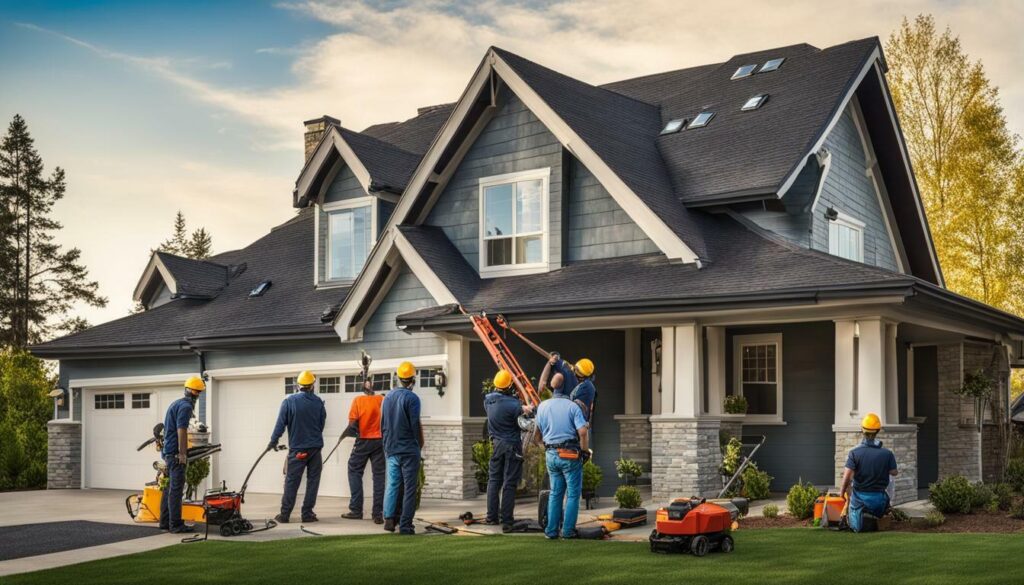
| Benefits of Working with Licensed Contractors |
|---|
| Knowledge of local regulations and permitting processes |
| Familiarity with the local building department |
| Insurance and bonds for protection |
| Reduced risk of errors or delays in obtaining permits |
| Expertise in maintaining safety and compliance |
“Hiring a licensed contractor for your roofing project not only ensures compliance with local regulations but also provides protection and peace of mind. Their knowledge and experience can help navigate the permitting process smoothly, reducing potential delays and errors. You can trust them to uphold safety standards and produce quality work.”
Conclusion
Working with licensed contractors is crucial when it comes to roofing projects requiring permits. They possess the necessary knowledge, experience, and understanding of local regulations to ensure compliance and a smooth permitting process. By choosing a licensed contractor, you can have confidence in the quality of their work and the adherence to safety standards. Ultimately, working with licensed contractors not only protects your investment but also provides peace of mind throughout the roofing project.
Potential Consequences of Skipping Permits
Failing to obtain roofing permits can result in penalties, fines, and the potential need to redo work, causing unnecessary expenses and complications. It is important to understand the consequences of skipping permits before starting a roofing project.
Firstly, not obtaining permits can lead to monetary penalties. Local building departments have the authority to issue fines for non-compliance with permit regulations. These fines can vary depending on the severity of the violation and the jurisdiction. By failing to obtain permits, you risk incurring significant financial costs that could have been avoided.
Secondly, skipping permits can lead to the potential need to redo the work. Without proper permits, your roofing project may not meet the required standards and regulations. In such cases, the local building department may require you to undo the work and start again, resulting in additional time, money, and effort wasted.
Furthermore, not having permits for your roofing project can create complications when selling your home. Prospective buyers will likely request information about permits and inspections. If you cannot provide documentation proving that the work was done with the necessary permits and passed inspections, it can hinder the sale process and potentially reduce the value of your property.
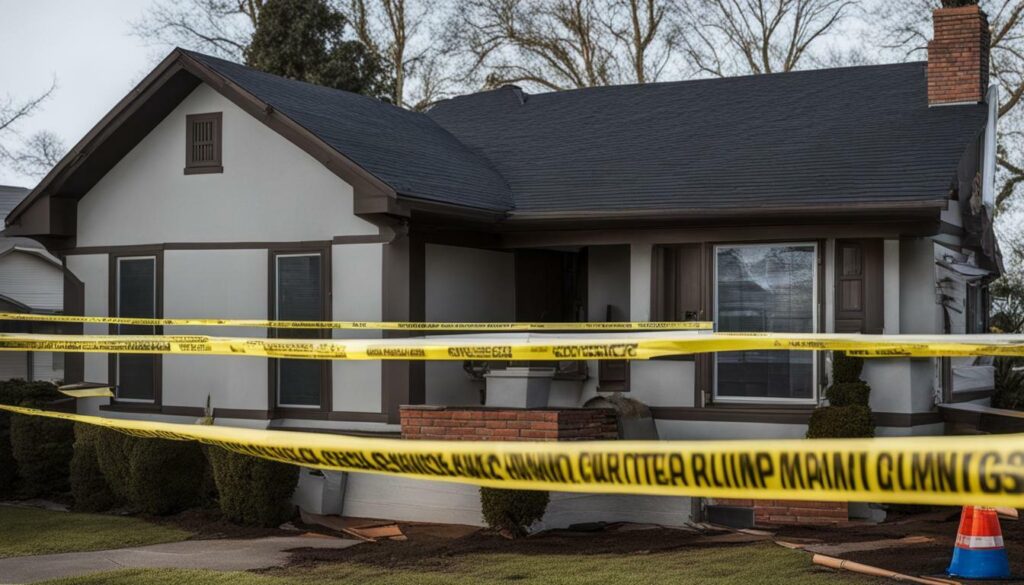
| Consequences of Skipping Permits |
|---|
| Penalties and fines issued by the local building department |
| Potential need to redo work, resulting in additional costs |
| Complications when selling your home |
In summary, it is crucial to obtain the necessary permits for your roofing project. This ensures compliance with safety standards, avoids penalties and fines, and prevents potential complications in the future. By working with licensed contractors who are knowledgeable about local regulations, you can navigate the permitting process smoothly and ensure a successful roofing project. Remember that the consequences of skipping permits outweigh the potential cost savings, making it a wise investment to obtain the required permits for your roofing project.
Importance of Inspections
Inspections are a vital part of the roofing permit process, as they ensure compliance with regulations and maintain safety standards throughout the project. Conducted by qualified inspectors, these inspections help verify that the roofing work meets the required standards and adheres to the approved plans.
During the inspections, the inspectors will carefully assess various aspects of the roofing project, including the structural integrity, fire resistance, moisture protection, and overall compliance with building codes. By thoroughly examining the work, they identify any potential issues or deviations from the approved plans, allowing for necessary corrections and ensuring that the finished roof meets all safety and quality standards.
Examples of inspections that may be conducted during a roofing project include:
- Structural inspections: These inspections focus on ensuring that the roofing structure, including the framing, supports, and connections, is sound and can withstand the expected loads and weather conditions.
- Fire inspections: These inspections verify that the roofing materials and installation techniques meet fire safety regulations, reducing the risk of fire hazards and promoting the overall safety of the building.
- Moisture protection inspections: These inspections assess the integrity of the roof’s moisture barrier and ensure proper installation to prevent leaks and water damage.
- Code compliance inspections: These inspections ensure compliance with all relevant building codes and regulations, covering areas such as ventilation, insulation, and energy efficiency.
By undergoing inspections, roofing projects gain an additional layer of quality control and assurance. Inspections help protect homeowners, contractors, and the community by ensuring that roofing work is done safely, meets regulatory requirements, and delivers a durable and reliable roof that will withstand the test of time.
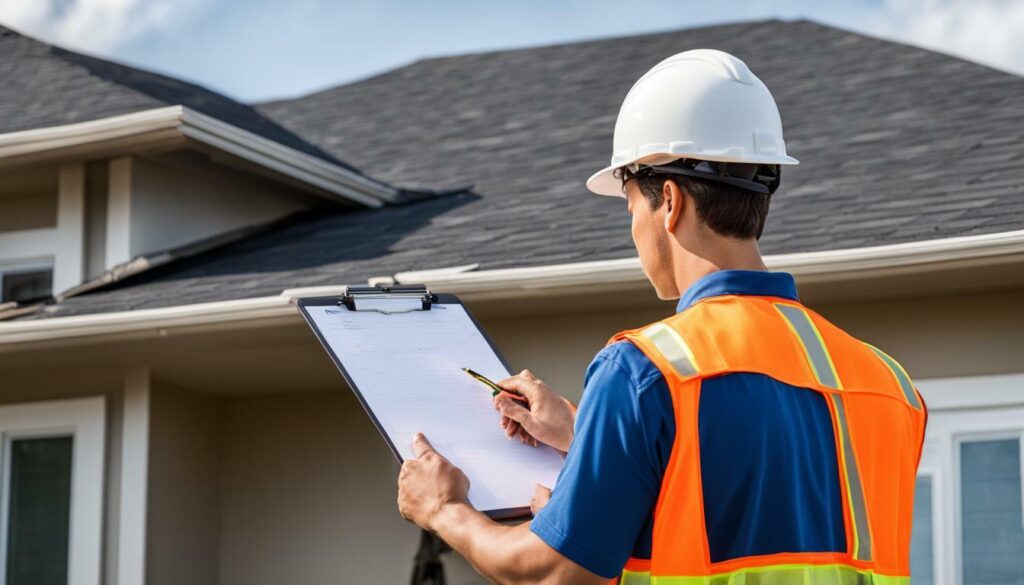
| Benefits of Inspections | Reasons for Inspections |
|---|---|
| Ensures compliance with building codes | Verifies safety standards |
| Identifies potential issues or deviations | Promotes quality control |
| Prevents future problems and costly repairs | Provides assurance for homeowners and contractors |
Navigating the Permitting Process: Tips for Success
Navigating the roofing permitting process can be easier with these tips and advice to help you gather the necessary documentation and understand the requirements. Starting a roofing project can be overwhelming, but being prepared and following the correct procedures will ensure a smoother process and avoid potential setbacks.
Gather the Necessary Documentation
The first step in obtaining a roofing permit is to gather all the necessary documentation. This typically includes detailed project plans, material specifications, contractor licenses, and proof of insurance. Having these documents ready beforehand will save you time and make the application process more efficient. It’s important to ensure that the plans and specifications comply with local building codes and regulations, so consult with the local building department if you have any questions or concerns.
Understand the Requirements
Each locality has its own set of requirements when it comes to roofing permits. Take the time to understand these requirements and ensure that your project meets all the necessary criteria. This may include specific building codes, setback distances, and design guidelines. By familiarizing yourself with these requirements, you can avoid potential delays or issues during the permitting process. Reach out to the local building department or consult with a licensed contractor to ensure that you have a clear understanding of what is expected.
Work with Licensed Contractors
Working with licensed contractors who are familiar with local roofing regulations and requirements can greatly simplify the permitting process. Licensed contractors have the knowledge and experience to navigate the application process efficiently and ensure compliance with all regulations. They can help you prepare the necessary documentation, submit the application, and schedule inspections. Hiring a licensed contractor also provides added peace of mind, knowing that the work will be done according to industry standards and in compliance with all applicable regulations.
Remember, obtaining a roofing permit is essential for the success and legal compliance of your roofing project. By following these tips and advice, you can navigate the permitting process with confidence and ensure that your project proceeds smoothly. Stay informed, gather the necessary documentation, and work with professionals who understand the local regulations. With proper planning and preparation, your roofing project will be on the right track from start to finish.
Conclusion
Understanding roofing permits and regulations is crucial for any roofing project. By obtaining the necessary permits and complying with local regulations, homeowners can ensure the safety and compliance of their roofing projects. Working with licensed contractors and following the proper permitting process will help avoid penalties, fines, and complications down the line. Remember, permits are there to protect you and ensure that your roofing project meets all necessary requirements.
FAQ
Q: Why are roofing permits necessary?
A: Roofing permits are necessary to ensure safety and compliance with local building codes and regulations. They are required for roofing projects that involve altering a building’s structure or creating hazardous working conditions.
Q: What types of roofing projects require permits?
A: Roofing permits are typically required for projects such as roofing a new home, replacing an old roof, altering a roofline, or changing the roofing material.
Q: What is the process for obtaining a roofing permit?
A: The permitting process involves submitting detailed information about the project, seeking approval from the local building department, and scheduling inspections to ensure compliance with regulations.
Q: Do roofing permit regulations vary by state?
A: Yes, roofing permit regulations can vary by state. It is important to check the specific requirements in your area, as different states may have different regulations for roof replacement and repairs.
Q: Is it the homeowner’s responsibility to obtain the roofing permit?
A: Yes, it is generally the homeowner’s responsibility to obtain the roofing permit. Failure to do so can lead to fines and the need to redo the work.
Q: Should I work with licensed contractors for roofing projects?
A: It is advisable to work with licensed contractors who are familiar with local regulations and requirements. Licensed contractors can help navigate the permitting process and ensure compliance with regulations.
Q: What are the potential consequences of skipping roofing permits?
A: Skipping roofing permits can result in penalties, fines, and complications when selling a home. It is important to obtain the necessary permits to avoid these potential consequences.
Q: Why are inspections important in the roofing permit process?
A: Inspections are important because they help ensure compliance with regulations and maintain safety standards. They are a crucial part of the roofing permit process.
Q: What tips can you provide for navigating the roofing permitting process successfully?
A: Some tips for navigating the roofing permitting process successfully include gathering necessary documentation, understanding requirements, and working with licensed contractors who are experienced with the process.
